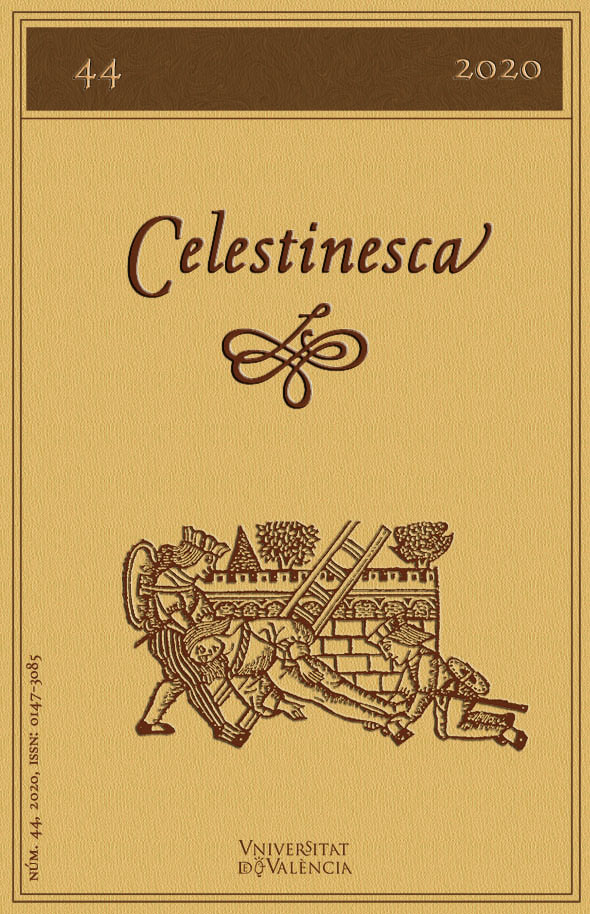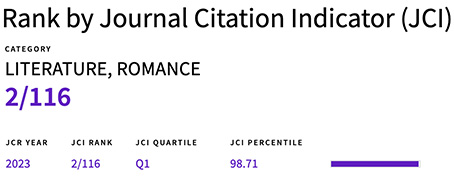Melibea Lies
DOI:
https://doi.org/10.7203/Celestinesca.44.19436Keywords:
Melibea, lies, self-deception, courtly love, sexual desire Abstract
Abstract
A close rereading of the Tragicomedia de Calisto y Melibea reveals a singularly striking element of Melibea’s personality –she is a habitual liar. She lies to Calisto, she lies to Celestina, she lies to her mother, she lies to her maid Lucrecia, she lies to her father, and most decisively, she lies to herself. While we might label the latter a mere case of self-deception or self-justification, her consistent proclivity to lie is at the center of her personality. Melibea exercises free will throughout the work. She decides to lie, to stray from the paths of truth, common sense, and realistic consideration of the consequences of her decisions. This fundamental trait of her personality contributes to the tragedia embedded in the hybrid title of the Tragicomedia.
 Downloads
Downloads
 References
References
Botta, Patricia (1994). «La magia en La Celestina.» Dicenda: Cuadernos de Filología Hispánica, 12, pp. 37-67. https://revistas.ucm.es/index.php/DICE/article/view/DICE9494110037A
Brooks, Kristen (2000). «Discovering Melibea: Celestina's Uncontainable doncella encerrada.» Celestinesca, 24, pp. 95-114. https://doi.org/10.7203/Celestinesca.24.19958
Burrus, Victoria A. (1994). «Melibea's Suicide: The Price of Self-Delusion.» Journal of Hispanic Philology, 19, nos. 1-3, pp. 57-88.
Burton, David (2003). «Fallen, Unrepentant, and Unforgiven: Calisto at the Madalena.» Celestinesca, 27, pp. 35-41. https://doi.org/10.7203/Celestinesca.27.20017
Canet Vallés, José Luis (2000). «Hechicería versus libre albedrío en La Celestina.» El jardín de Melibea: Monasterio de San Juan, Burgos, 18 de abril-20 de junio de 2000, coord. Juan Carlos Elorza Guinea, Sociedad Estatal para la Conmemoración de los Centenarios de Felipe II y Carlos V, pp. 201-28.
Casa, Frank P. (1968). «Pleberio’s Lament for Melibea.» Zeitschrift für Romanische Philologie, 84, 20-29. https://doi.org/10.1515/zrph.1968.84.1-2.20
Deyermond, Alan (1977). «Hilado-cordón-cadena: Symbolic Equivalence in La Celestina.» Celestinesca, 1-1, pp. 6-12. https://doi.org/10.7203/Celestinesca.1.19447
— (1990). «Pleberio’s Lost Investment: The Worldly Perspective of Celestina, Act 21.» Modern Language Notes, 105-2, pp. 169-79. https://doi.org/10.2307/2905287
Gómez Goyzueta, Ximena (2013). «La Tragicomedia de Calisto y Melibea: amor e ironía en Melibea.» Medievalia, 45, pp. 34-40. https://revistas-filologicas.unam.mx/medievalia/index.php/mv/article/view/282
Handy, Otis (1983). «The Rhetorical and Psychological Defloration of Melibea.» Celestinesca, 7-1, pp. 17-27. https://doi.org/10.7203/Celestinesca.7.19563
Herrero, Javier (1984). «Celestina's Craft: The Devil in the Skein.» Bulletin of Hispanic Studies, 61-3, pp. 343-51. https://doi.org/10.1080/1475382842000361343
Iglesias, Yolanda (2010). «Rompiendo las cadenas: el libre albedrío en los personajes de La Celestina.» Celestinesca, 34, pp. 57-73. https://doi.org/10.7203/Celestinesca.34.20124
Lida de Malkiel, María Rosa (1977). Dos obras maestras españolas: «El libro de buen amor» y «La Celestina», 4th ed., Buenos Aires, Editorial Universitaria de Buenos Aires.
— (1962). La originalidad artística de «La Celestina», Buenos Aires, Editorial Universitaria de Buenos Aires.
Madariaga, Salvador de (1972). Mujeres españolas, Madrid, Espasa Calpe.
Maravall, José Antonio (1976). El mundo social de «La Celestina», Madrid, Gredos.
Mier, Laura (2008). «La conciencia de Melibea.» Celestinesca, 32, pp. 231-43. https://doi.org/10.7203/Celestinesca.32.20116
Muñoz-Basols, Javier (2003). «La funcionalidad de la adopción discursiva en La Celestina: de Melibea a Melilithbea.» Celestinesca, 27, pp. 107-24. https://doi.org/10.7203/Celestinesca.27.20022
Ramírez Santacruz, Francisco (2004). «Individualismo a ultranza en La Celestina: Areúsa y Melibea.» Graffylia: Revista de la Facultad de Filosofía y Letras, 2-4, pp. 64-71.
Rojas, Fernando de (2020). La Celestina, ed. Dorothy S. Severin, 30th ed., Madrid, Cátedra.
— (2018). La Celestina: Comedia o tragicomedia de Calisto y Melibea, ed. Peter E. Russell, 2nd ed., Madrid, Clásicos Castalia.
Scarborough, Connie L. (2007). «Celestina: The Power of Old Age.» Old Age in the Middle Ages and the Renaissance: Interdisciplinary Approaches to a Neglected Topic, ed. Albrecht Classen, Berlin, Walter de Gruyter, pp. 343-56.
— (2012). «Speaking of Celestina: Soliloquy and Monologue in the Tragicomedia de Calisto y Melibea.» Celestinesca, 36, pp. 209-36. https://doi.org/10.7203/Celestinesca.36.20153
— (2010). «The Tragic/Comic Calisto: Obsessed and Insecure.» Celestinesca, 34, pp. 179-200. https://doi.org/10.7203/Celestinesca.34.20128
Snow, Joseph T. (2017). «La metamorfosis de Melibea en la Tragicomedia de Calisto y Melibea.» Celestinesca, 41, pp. 153-66. https://doi.org/10.7203/Celestinesca.41.20210
Downloads
Published
How to Cite
-
Abstract1717
-
PDF513
Issue
Section
License
![]() Celestinesca is committed to the dissemination of knowledge, that is why access to its contents is free and is ruled by a Creative Commons Attribution-NonCommercial-NoDerivatives 4.0 license.
Celestinesca is committed to the dissemination of knowledge, that is why access to its contents is free and is ruled by a Creative Commons Attribution-NonCommercial-NoDerivatives 4.0 license.
Authors retain the rights to their works. Therefore, they can disseminate them and deposit them in the repository, institutional or not, that they wish. However, they are kindly requested to do so by providing the full bibliographic reference and the corresponding DOI.
Celestinesca does not charge authors for submitting, processing, reviewing or publishing their articles.





